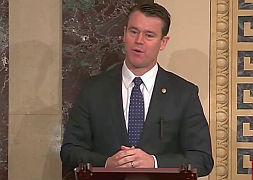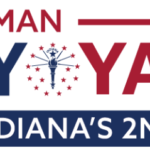 U.S. Senators Todd Young (R-Ind.), Debbie Stabenow (D-Mich.), and Doug Jones (D-Ala.) last week introduced bipartisan legislation to make sure that more students have access to higher education. Under current law, students only find out how much financial aid they will receive right before attending college. The Early Pell Promise Act provides more financial certainty for families by pre-qualifying certain students for full Pell Grant support starting as early as the eighth grade. It also ensures that families and students who pre-qualify for aid receive additional information about the cost of college attendance and student financial aid.
U.S. Senators Todd Young (R-Ind.), Debbie Stabenow (D-Mich.), and Doug Jones (D-Ala.) last week introduced bipartisan legislation to make sure that more students have access to higher education. Under current law, students only find out how much financial aid they will receive right before attending college. The Early Pell Promise Act provides more financial certainty for families by pre-qualifying certain students for full Pell Grant support starting as early as the eighth grade. It also ensures that families and students who pre-qualify for aid receive additional information about the cost of college attendance and student financial aid.
“My Fair Shot Agenda is focused on ensuring that all Hoosiers have an opportunity to succeed regardless of financial barriers,” said Senator Young. “The Early Pell Promise Actaligns with this mission by ensuring our youth is set up for success through pre-qualification for Pell grants. By locking in financing for college as early as the eighth grade, more students will be able to afford higher education and plan for a prosperous future.”
“Too many young people in Michigan aren’t aware of the resources available to help them find the right college, let alone how to make it a reality,” Senator Stabenow said. “Every child in America, no matter their financial situation, should know that if they work hard, study hard, and get good grades, the opportunity to attend college will be available after high school.”
“It is important that students are aware of the resources available to them to access a college education,” said Senator Jones. “Providing students with an early commitment of financial support will help them take the necessary steps to prepare to pursue their higher education goals. This bipartisan legislation will help more hard-working students achieve their dream, not just those who can afford it.”
Modeled after successful Promise Programs across the country like Indiana’s 21st Century Scholars program, this legislation takes best practices from states and localities and applies them to the federal financial aid system. Some states and localities that have implemented early financial aid commitment programs have seen a twenty to thirty percent increase in college enrollment. Numerous studies show that the earlier students are given information about financial aid options and benefits of post-secondary education, the more likely they are to finish high school and go to college.
The Early Pell Promise Act has been endorsed by the National Association of Student Financial Aid Administrators, National College Access Network, and the Education Finance Council.














